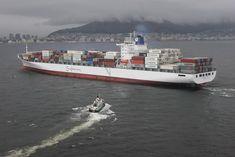
When it comes to the logistics of getting citrus into the UK, there are a number of entry points competing for the business.
The Bristol Port Company (BPC) is one of those entry points, and it is actively pursuing extra business in the citrus sector, says Simon Bird, chief executive.
“The plan for us, which is an excellent opportunity, is to go after more Mediterranean citrus, particularly Spanish fruit. That’s something we’re looking into at the moment.”
He says there is an increasing opportunity to shift produce off the roads and onto the ships.
“We’re looking to tap into produce that would normally be coming on the roads. We want to get it off the trucks and onto the ships from southern Spain.”
He says the road transport system is under an ever increasing burden of rising costs: “The European working time directive has meant transport rates have increased by 20 per cent and the French government is putting restrictions on the vehicles coming through France.”
Bird points out that all of these issues provide good reasons to shift the shipping off the roads onto the water. “Costs for trucking are going up considerably, and while shipping costs are rising, they are not rising at anywhere near the same rate.”
Brent Stephen, BPC fresh produce trade manager, says it is something the company has been working on for a while. “We’ve done some trials on containers out of Bilbao in Spain on iceberg lettuce and if we can prove it works on that, then everything else will be easy.”
He says the port has entered into discussion with a shipping company operating out of Spain. “They think they can achieve what we’re looking to do with a fleet of six ships that will carry 45 foot containers. We’ve been talking to a number of customers about that and there’s increasing interest in that.”
He says it involves high start-up costs, but there are significant savings to be made down the line. As well as Bilbao, Bristol is looking to establish shipments out of Cartagena and Valencia.
“We’re not looking to replace the road networks, its never going to do that, but it’s a viable alternative and it will become more attractive over time.”
Meanwhile, the port has built up a significant business in industrial citrus from South America recently, says Stephens. “That’s caused quite a bit of interest, because of our proximity to juicing people in the UK who were all very pleased with the standard of the produce they were getting through us.”
He says Bristol is starting to do some industrial citrus from Egypt now as well. The port is also targeting South Africa and South America on conventional citrus, he adds.
The port has also invested in its facilities, with phase two of its fresh produce terminal due for completion on March 1.
Bird says: “So far we’ve spent £16.5 million developing the terminal. The first phase saw space for 8,000 pallets and the second phase increases that by 6,000 so we now have room for 14,000 pallets.
“We now have 16 chambers with temperatures ranging from -1°C to 12°C, and we’re now handling shipments from South Africa and Chile and also New Zealand.”
South Africa is one of the largest exporters of citrus and is undergoing some significant developments in it shipping of fruit, says Gerrit Booyens, chief executive of Cirtus SA, a leading grower co-operative.
He says: “We’re working very hard on supply chain management, particularly focusing on velocity. We’re changing the nature with which we handle our fruit through the ports.”
He says increased investment in information technology has improved planning throughout the supply chain. “We’re now seeing dispatch from the orchards and not the warehouse, so the products will be moving through the ports that much quicker. We’re turning the ports from a storage point, awaiting shipment, into a transit point.”
Safmarine is one of the largest shippers of perishables from South Africa to Europe and, as a result, ships a significant amount of citrus.
The company exports the fruit mainly in conventional ships, but says containerised exports are gaining momentum with shippers making increasing use of integral reefer containers.
A spokesman says: “Citrus is without doubt a very important target area for Safmarine, as citrus out of South Africa currently represents a growing market and we want to be a partner in that growth.”
The company says there are several key reasons for the shift to containerised transport. “It means the cold chain remains unbroken when using a reefer container, there’s minimal handling of the product, reducing the risk of damage and containers can be delivered door to door, rather than port to port.”
Safmarine has now invested in faster and larger vessels to meet this growing demand.
The company says its new tonnage on the European routes have now seen all the old systems replaced with the latest reefer technology.
During the second half of 2004 and the first quarter of 2005, Safmarine introduced five new ships into the trade, three for the West Africa - Europe trade, and the remaining two for the South Africa - Europe route.
The spokesman says: “Improved technology, both on vessels and in containers, together with increased reefer capacity on this trade is attracting the attention of citrus shippers.”



